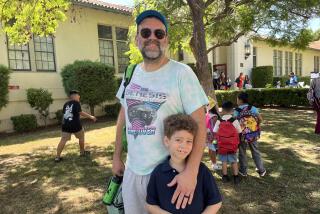Big plans at the escuela
Twenty kindergartners gathered expectantly around their teacher Wednesday, the first day of an urban experiment nearly two years in the making at Aldama Elementary School in Highland Park. They are going to learn Spanish and English and, teacher Amanda Kunkel promised, have fun.
But they just had to do one thing first.
“This would be a good time to say goodbye,” Kunkel gently told the anxious parents ringing the back of the room.
It’s not an unusual scene: Lots of mothers and fathers have a tough time letting go on the first day of school. But it was especially difficult for some Aldama parents who brought equal parts of idealism and economic reality to work with L.A. Unified officials on starting a Spanish and English immersion program at their neighborhood campus.
The process, which parents and school district officials said went smoothly, is also a potential glimpse into the future of Highland Park, where low home prices attracted a new generation of middle-class residents who wanted to send their children to the local school and who weren’t afraid to lobby school district officials aggressively.
“These are more sophisticated parents. They know what the future looks like for their children, and it’s one where they have to compete in a global economy,” said school board member Yolie Flores Aguilar, who represents the area. “It creates the opportunity for other moms to also benefit.”
The scene was more chaotic last week when parents of dual-immersion students met at Courtney Mykytyn’s hillside home for pizza. Boys raced toy cars in the living room, girls played on the swing outside, and parents had sangria and chatted with the program’s two teachers.
The group, led by Mykytyn, first met almost two years ago to look for ways to improve the local elementary schools.
Many of the parents moved into the neighborhood during the real estate boom before they had children, figuring that they would leave in a few years, preferably to South Pasadena, which has a highly rated school district.
Mykytyn said she wasn’t even seriously thinking of having children when she bought her house a decade ago.
At that point, “I didn’t think I’d be cooking dinners on a regular basis,” Mykytyn said. “We were figuring the schools didn’t matter.”
By the time she began contemplating where to send her eldest child, Stefan, to school two years ago, she couldn’t afford to move.
So she and several other mothers, including a Times reporter, began trying to find ways to improve the local schools and wanted their children to learn Spanish.
The parents, including Susan Phillips, who studies urban school districts as part of her job as an environmental studies professor at Pitzer College, and Carvell Wallace, a screenwriter, had no experience working with L.A. Unified, the nation’s second-largest district.
“It was daunting,” Phillips said.
After initially trying to organize a program at Yorkdale Elementary School, parents met with Richard Alonzo, the district’s local superintendent, last year at a public library.
“The place was jampacked with moms with strollers and pregnant moms,” Alonzo said.
District officials suggested a dual language program, so Alonzo sent parents on field trips to schools with similar programs and eventually found space and community interest at Aldama for a 40-student class. Initially, the parents were concerned that a group of new mothers and fathers were pushing their personal agendas on the school, said Luis Valentino, the director of elementary school services for the area.
“The one thing they feared was that someone was coming in to take their seats,” Valentino said.
No one was displaced, and the program has an equal number of native Spanish and English speakers with the goal that all of them will be fluent in both languages by fifth grade. Luciana Macias doesn’t speak English well and enrolled her daughter, Ashley Rodriguez, in the program after she saw a flier on the street.
“It would be easier for her to learn English,” Macias said in Spanish, wiping a tear away after she left her daughter in the classroom.
If the dual-language program is an experiment, the new parents are well aware that their children are the guinea pigs.
Jeremy Myers said he would pull his son, Benjamin Harris-Myers, from Aldama if his son wasn’t learning, and he said he was willing to move to find a better school. But Myers hopes the program succeeds.
“I thought that money would solve all problems, but I like the idea of being part of something larger,” he said.
--
More to Read
Sign up for Essential California
The most important California stories and recommendations in your inbox every morning.
You may occasionally receive promotional content from the Los Angeles Times.











